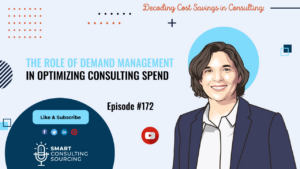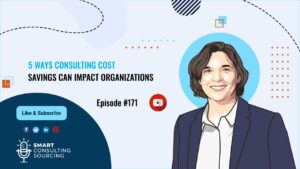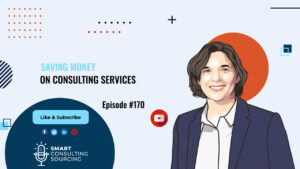Hello and welcome to episode 30 of our podcast: Smart Consulting Sourcing, THE podcast about Consulting Procurement. My name is Hélène, and I’ll be your host today.
Each week I’ll give you the keys to better use, manage and source consulting services. This week, I’ll discuss How to draft the right consulting agreement?
Last week, I explained How to prepare the transition for when the consultant departs?
We saw that preparing for the takeover after the consulting project is finished is just a matter of organization and that it will benefit both procurement and internal clients. And there is another part of the sourcing process that has the same effect: drafting the right consulting agreement.
Simplification goes a long way when drafting a Consulting agreement. However, you need to always consult with your Legal team first and foremost when drafting your agreement, but here are some great recommendations.
The 4 Main Dimensions a Consulting Agreement Usually Covers:
- Statement of Work, what will be done during the project,
- Terms and Conditions, what will be paid and how,
- Rules for delivery, how the work will be done,
- Deviation measures, what will be done if there is an issue.
But let me break down these elements into 10 things to look closely.
1. Include Your Expectations in your consulting agreement
The first step when drawing up the contract is to define the Statement of Work (SOW), or in other words, to lay out your expectations of the project. The goal of the SOW is to make sure the Consulting providers commit to the results and not the means.
The elements stipulated in the contract will be the reference in case the performance is not at the level you expected.
The statement of work normally includes:
- Scope of Work and Deliverables,
- Schedule and Phasing,
- Governance and Escalation,
- Expected outcome and Metrics.
When you are working with a frame contract or Master Service Agreement (MSA), the statement of work will serve as a Consulting Agreement. It will define the work to be done and the specific terms on the other dimensions. The rest of the terms will be covered in the MSA.
2. Specify the Timeline for the Project.
The timeline should clarify and define the different deadlines, including the phasing, the milestones, and the schedule for the deliverables. You can also add the project schedule in the appendix as you did for the scope of work.
3. Establish a Governance Model.
In your SOW, you should describe the governance of the project and, in particular, the escalation procedure. Clarify how the performance will be measured. The SOW needs to specify the metrics to assess the success of the project.
For intangible services like consulting, you can define SMART objectives that serve as a guideline to make sure the quality of delivery is there. We have said several times that Consultants should commit to the results, not the means. However, in certain circumstances, the means can be of importance too.
When you have chosen a specific Consulting firm for their team composition or the availability of a given expert, you can (and should) add your expectations to the contract.
4. Set Escalation Process Guidelines.
All types of issues might arise in the course of a project, and it’s highly recommended that every organization has an Escalation Process protocol. As a project manager, it’s your responsibility to remove the obstacles teams might face that can lead to delays or inadequate deliverables.
The issues should be documented and forwarded to the manager in charge, the project sponsor, and to higher management to address them; in other words, an Escalation Process should take place. Often there are tough decisions to be made, but escalation is a healthy part of the project’s life, and it generally benefits all the parties.
5. Clarify How the Performance will be measured.
As we discussed previously, the SOW (Scope of Work) needs to specify the metrics to evaluate the success of the project. For intangible services like consulting, you can define SMART objectives that serve as a guideline to make sure the quality of delivery is there.
6. Define the Commercial Terms.
Once you have defined what the Consulting firm was supposed to do, you can move to how they will get paid. The agreement needs to state very clearly how the Consultants will be paid, the amounts, and the conditions linked to the payments.
For hourly fees, include the detailed amounts for each type of Consultant, the kind of cap, if any (hard or soft), and the number of hours to reach the cap. For a risk-sharing model, clearly define the variable compensation, the metrics on which the variable compensation is based, and how they will be measured.
7. Set the Payment Terms and the Applicable Taxes.
All Consulting agreements naturally define payment terms. Make sure to negotiate terms that are compliant with your company policy. The contract usually states the net price (before sales tax).
Set up a time limit on when payments are due. Standard terms are usually applied between 30 to 60 days after the invoice is issued. Define the timing of the payment, i.e., weekly, monthly, phase-based, or lump sum.
For very large projects, you should consider a monthly schedule. You can also add the description of the fees in the appendix.
8. Arrange for Agreement Renewal and Extension.
It can be useful when the scope of work is still unclear, to include the potential of extension of the contract. Likewise, for a recurring project, or a project with several phases, you can add the conditions of renewal in the projects. In both cases, the client should be the one deciding to extend or renew the contract.
9. Secure Confidentiality.
Confidentiality is a crucial clause in any Consulting agreement. You would not want the Consultant to go around and tell you about the project done with you. If a certain kind of confidential information concerns you, write it in plain English in the contract.
Also, make sure you understand the limitations of confidentiality agreements, in particular, when you work globally. Each culture or country has its own approach (and set of laws) to confidentiality. Besides, confidentiality should be limited in time and space.
10. Manage security requirements & conflict of interest
If you work with sensitive information, you probably have strict security requirements, and you might want to include these elements in the contract. On certain sensitive projects, the Consulting provider might have a conflict of interest if they are already working with a competitor or a client of yours.
You can negotiate an exclusivity, but it often comes with additional fees. You can include in your contract a list of specific companies or a broader definition of your competitors.
If you don’t want the Consulting firm to work with your Competitors AFTER the project is over, you need to include a non-compete clause in your contract. For both clauses, you have to give reasonable time and scope limits. Be aware that they are difficult to enforce, so these should be used only in special cases.
Having robust consulting agreement templates is a key element in managing consulting projects. Not all projects go well, and that’s ok. Agreements are an excellent way to make that your expectations are understood, and a reference to build your case if the project goes awry.
That’s it for today. Next time, I’ll explain Why should Finance and Strategy get involved in decision-making on large consulting projects?
In the meantime, if you have any questions, or want to learn more about what we do at consulting quest, just send me an email at helene.laffitte@consultingquest.com
You can also have a look at our website consultingquest.com to know more about our book and download free templates & guides to improve your consulting sourcing.
Bye and see you next week! Au revoir!







